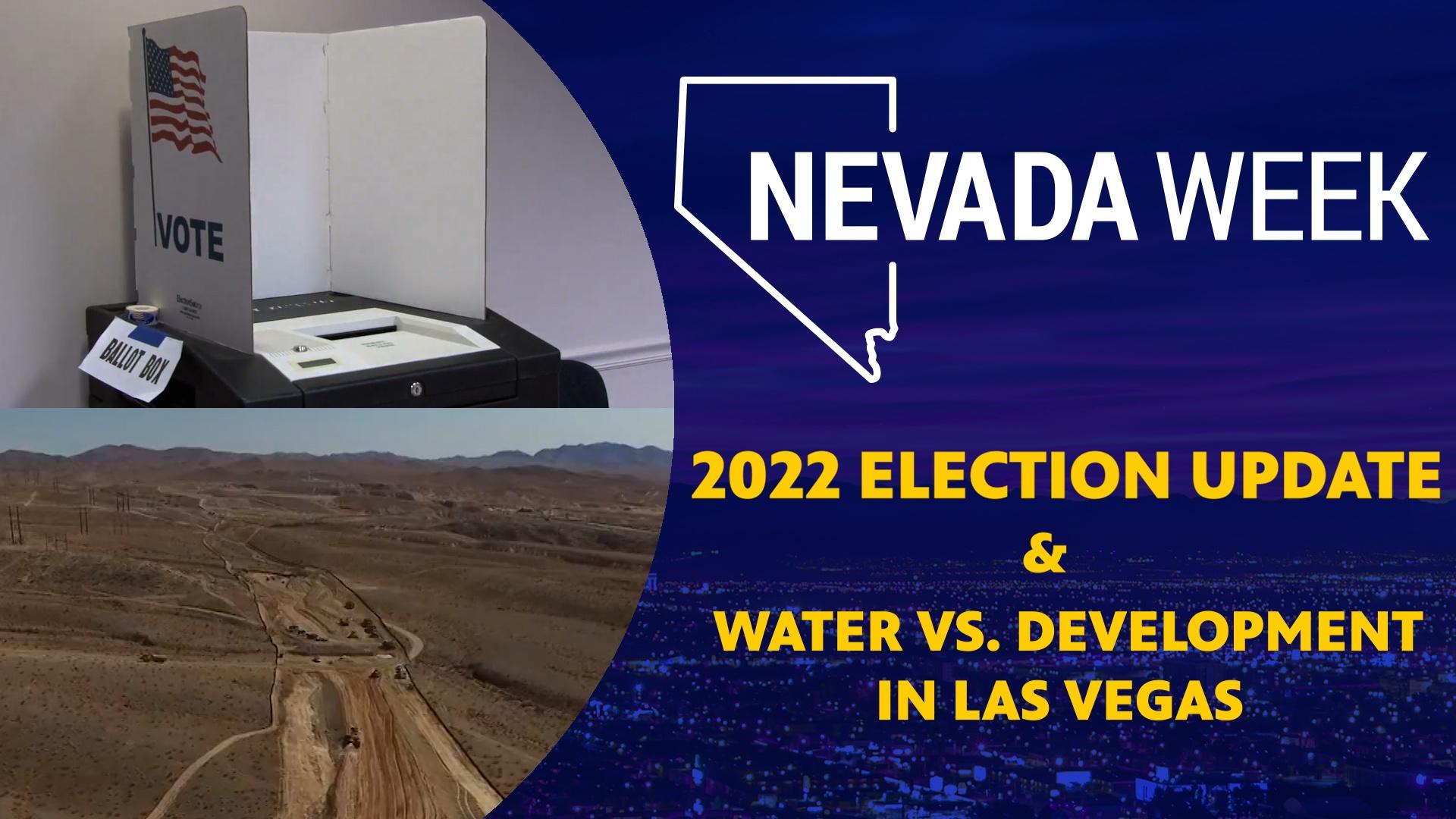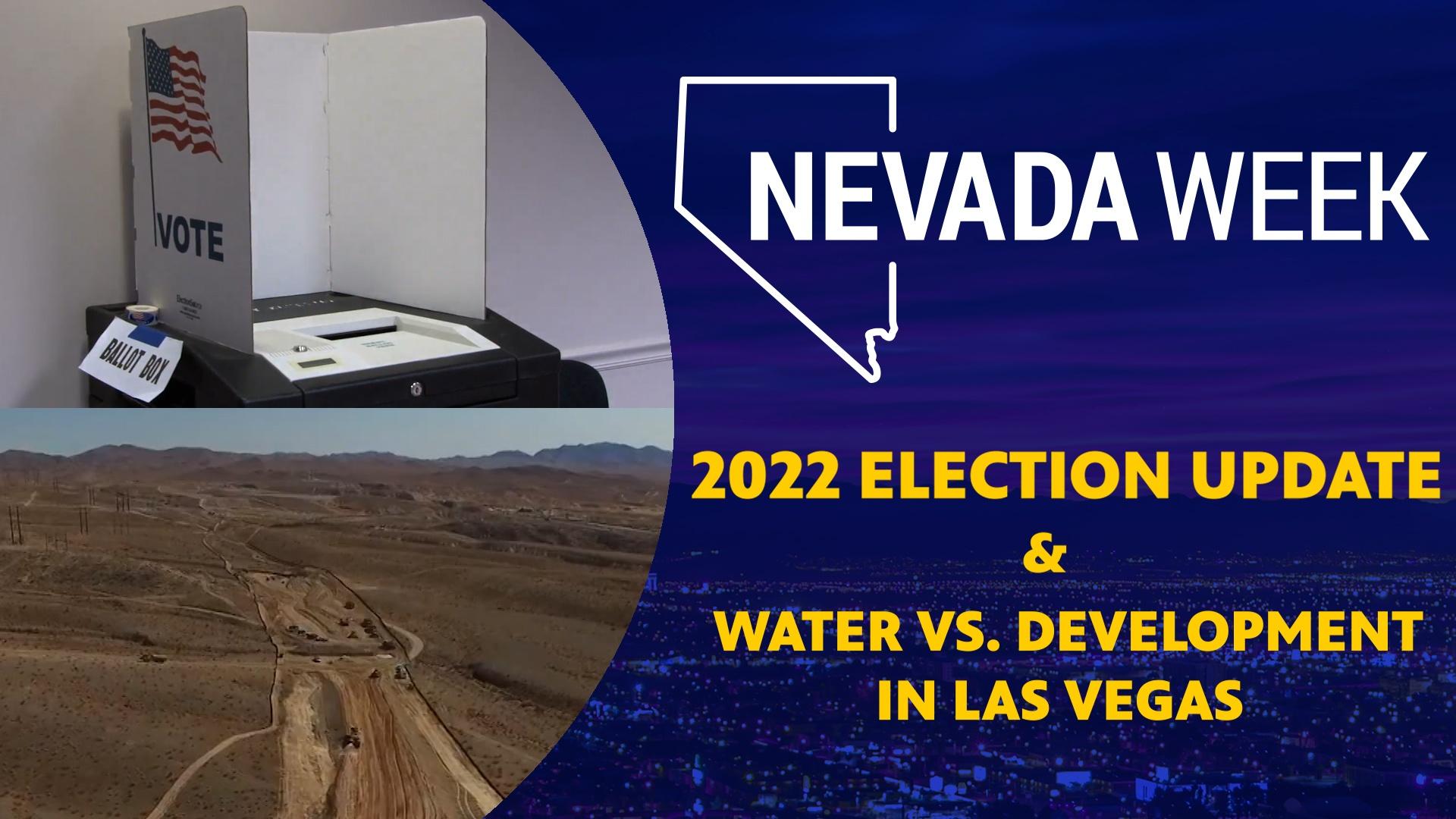2022 Election Update and Water vs. Development In Las Vegas | Nevada Week


The key races in the 2022 elections and how our water supply could impact development.

SEASON 4: EPISODE 38 | Airdate: 3/31/2022
ELECTION 2022 UPDATE
The filings are done for the 2022 election. The next step in the election cycle is the June primary.
Colton Lochhead is the political reporter for the Las Vegas Review-Journal. He joined Nevada Week to break down some of the races on the ballot in Nevada.
First, the race for governor. Lochhead said that on the democratic side former Clark County Commissioner Tom Collins was not going to be much of a challenger to incumbent Gov. Steve Sisolak.
He did say that many pundits are predicting a red wave across much of the country. Historically, the party that controls the White House loses in the mid-terms after the presidential election, which means the Democrats could suffer losses across the country.
Lochhead did note that Nevada tends to go its own way, especially when it comes to the governor. He said the state has never been shy about splitting the ticket in the governor’s race.
However, Sisolak has a large war chest and will be building that why the myriad of Republican candidates running to unseat him will have to continue to spend from their election coffers to win the primary.
On the GOP side, Clark County Sheriff Joe Lombardo has the name recognition, especially down south, and money. Lochhead said Lombardo had about $2.5 million in his election war chest. In addition, he is so far leading in polls with North Las Vegas Mayor John Lee, former Senator Dean Heller and Reno attorney Joey Gilbert in the middle of the pack.
Lochhead said Lombardo’s opponents are trying to paint him as less conservative. In primary elections, candidates must appeal to the base because they are more likely to come out and vote. But when the general election comes around, they all must pivot back to the center to appeal to independent voters. Lochhead said Lombardo will have to do the same thing in the gubernatorial race.
He also said that the 2020 election will be a prime topic in the Republican primary.
“What you’re seeing in Joe Lombardo’s case is he’s trying to not talk about that as much and I think he’s banking on the idea that there are people that are looking to move beyond the 2020 election – moderate Republicans that are looking to talk about other issues,” he said.
Lochhead said that issues like the economy, gas prices, and inflation – “bread and butter” Republican issues are taking center stage over accusations that the 2020 election was stolen or rigged – accusations for which there is no evidence.
He also believes independent voters will be very important in the election this year. Lochhead said those voters tend to lean left or right, but they’re just not committed to one party when they register to vote.
Another important race is the one for Senate. Senator Catherine Cortez Masto is the incumbent. She’ll likely face former Attorney General Adam Laxalt in the general.
The nonpartisan Cook Political Report called the Nevada Senate race “a toss-up,” which is something Lochhead agrees with. He said statewide races in Nevada are within the grasp of either party. He noted that when Laxalt ran for governor he only lost by four points.
“It is well within striking range for Republicans even with Democrats having a registration advantage,” he said.
The Senate race is one of the most competitive in the country and is one of three seats in the Senate the Democrats are trying to defend. Democrats are also concerned about seats in Arizona and Georgia.
APEX INDUSTRIAL PARK
More progress to report at the Apex Industrial Park in North Las Vegas. The 18,000-acre industrial space is attracting new developers and companies as work continues to expand crucial infrastructure in the area like water and power.
And that work, city officials say, could get fast-tracked if Southern Nevada wins certain federal dollars.
On a windy, dusty day in North Las Vegas, the city’s mayor, John Lee, met with Nevada Week at the lower end of Apex Industrial Park where the hydrogen plant Air Liquide is approaching completion.
“This is a state-of-the-art company,” Lee said, “If somebody like this, an international company like that is coming, the rest of the world can rest assured that North Las Vegas can fill their needs too.”
But those needs, for utilities like water and electricity, weren’t always available at this remote park off Interstate 15 at U.S. Highway 93.
Still, electric car manufacturer Faraday Future was willing to take a chance.
In 2016, the company broke ground on a 3.4 million-square-foot plant only to pull out of the project the very next year amid financial struggles.
In 2019, Faraday sold its Apex property all together for less than half the asking price, according to the Las Vegas Review-Journal.
Mayor Lee’s outlook?
“That was probably the greatest thing that ever happened to North Las Vegas,” he said, “I couldn’t get people to understand what Apex would be. It was well, if you have power and sewer out there, we’ll come out and we’ll build but water and power wouldn’t come until somebody came and built so that was the conundrum I was in. Apex put… I mean, pardon me. Faraday put Apex on the map. The whole world started realizing what was happening in Southern Nevada, exclusively what is happening in North Las Vegas and tell me about that real estate out there.”
And that interest in Apex real estate remains high says Jared Luke, director of government affairs and economic development for the city of North Las Vegas.
“Real estate prices in the industrial sector in LA and other surrounding areas have skyrocketed, where our prices here are a third or a quarter of those prices there,” Luke said, “So we’re seeing a constant migration of companies looking for suitable land where they can build logistics, industrial, advanced manufacturing in an area that their bottom line they can actually see a profit someday because it’s not being eaten up by land costs. But still has a proximity to ports in LA, Phoenix, Utah.”
But those companies will still need access to water and if they’re located in the lower Apex, Luke says, they’ll already have it.
“We do have our own city line that comes up through the center of the Apex,” he said, “Right now we’ve got lower Apex where we were just at earlier. You’ve got Air Liquid, Ball Corporation and Kroger. That line is already in place. It was a public-private partnership with local developers and landowners out here. We’re working on phase two of that line right now that will wrap around what we call Solo Mountain which will be central Apex. And that line is in production now.”
Luke says that city line will eventually reach the north part of Apex. A process he says will be sped up if Southern Nevada wins the Build Back Better Regional Challenge Grant, which was created with American Rescue Plan dollars meant to boost economic recovery from the pandemic.
To Luke and Mayor Lee, Southern Nevada’s economic recovery depends in part upon diversifying its economy with less reliance on gaming and tourism.
“The importance of that grant, if we were to win it, is that not just Apex but other regions throughout all of Southern Nevada can put shovels in the ground on projects that are going to immediately kick start industrial and other type of diversification of the economy,” Luke said.
And Lee agreed.
“We are getting major manufacturing. Life-changing companies to go to work for, good pay, good benefits that you’ve diversified the incomes of your families in North Las Vegas.”
Apex infrastructure also stands to benefit from federal dollars through the infrastructure investment and jobs act.
Luke says the city is in communication with the state on how that money will be spent.
WATER SUPPLY AND DEVELOPMENT
The city of North Las Vegas has its own water pipeline into Apex and the ultimate goal for it is to eventually link up with a Southern Nevada Water Authority pipeline that will then allow water to be carried to and from Apex.
John Entsminger, the general manager of the Southern Nevada Water Authority, said they agreed to build the pipeline and wastewater infrastructure so that the water used at Apex can be recycled and put back into Lake Mead.
He said that one of the main advantages of Las Vegas is the fact that it sits upstream from Hoover Dam, which allows every drop that hits a drain in Southern Nevada can be treated and put back into Lake Mead.
Now that development is moving outside of the valley, into places like Apex, Entsminger said it was imperative that the water recycling program goes out as well and that water is brought back to be treated and recycled.
Southern Nevada has been a world leader in urban water conservation, but Entsminger said we have no time to rest on our laurels and we need to do more to conserve even more.
That is one of the reasons the SNWA supported a new law that requires nonfunctional turf or grass that is not being used for anything except atheistic purposes to be taken out and replaced by desert landscaping by 2027.
Water is vital, but a limited resource in Southern Nevada.
Tina Quigley, the new CEO of the Las Vegas Global Economic Alliance, said it was one of the challenges Southern Nevada faces as it looks to diversify its economy.
Entsminger said entities like LVEGA and the Governor’s Office of Economic Development need to look at “jobs per gallon” or “return on water not return on investment” when they look at which businesses get the coveted tax incentives from the state.
That doesn’t mean that Entsminger wants the SNWA to take on a regulatory role when it comes to Nevada business. He wants to work with cities, counties, and the LVEGA to have a comprehensive water plan for the whole region so that it can grow and diversify in a sustainable way.
